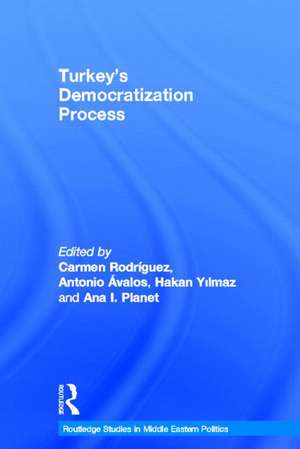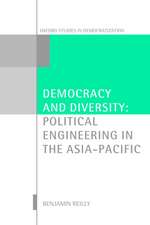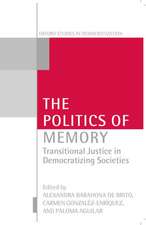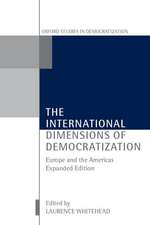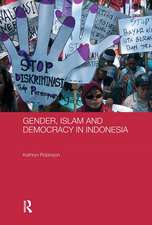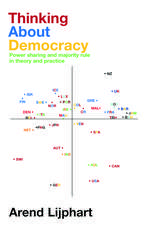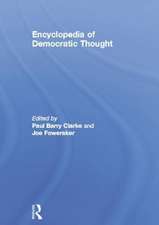Turkey's Democratization Process: Routledge Studies in Middle Eastern Politics
Editat de Carmen Rodriguez, Antonio Avalos, Hakan Yilmaz, Ana Planeten Limba Engleză Hardback – 9 oct 2013
Turkey’s Democratization Process utilises the theoretical framework of J.J. Linz and A.C. Stepan in order to assess the complex process of democratization in Turkey. This framework takes into account five interacting features of Turkey’s polity when making this assessment, namely: whether the underlying legal and socioeconomic conditions are conducive for the development of a free and participant society; if a relatively autonomous political society exists; whether there are legal guarantees for citizens’ freedoms; if there exists a state bureaucracy which can be used by a democratic government; and whether the type and pace of Turkish economic development contributes to this process.
Examining the Turkish case in light of this framework, this book seeks to combine analyses that will help assess the process of democratization in Turkey to date and will be of interest to scholars and researchers interested in Turkish Politics, Democratization and Middle Eastern Studies more broadly.
Din seria Routledge Studies in Middle Eastern Politics
-
 Preț: 311.41 lei
Preț: 311.41 lei -
 Preț: 280.08 lei
Preț: 280.08 lei -
 Preț: 309.89 lei
Preț: 309.89 lei -
 Preț: 302.13 lei
Preț: 302.13 lei - 9%
 Preț: 1004.93 lei
Preț: 1004.93 lei - 18%
 Preț: 1065.06 lei
Preț: 1065.06 lei - 18%
 Preț: 1170.14 lei
Preț: 1170.14 lei - 12%
 Preț: 300.49 lei
Preț: 300.49 lei - 18%
 Preț: 1057.57 lei
Preț: 1057.57 lei - 12%
 Preț: 300.49 lei
Preț: 300.49 lei - 18%
 Preț: 1162.08 lei
Preț: 1162.08 lei - 28%
 Preț: 850.37 lei
Preț: 850.37 lei - 18%
 Preț: 1066.09 lei
Preț: 1066.09 lei - 18%
 Preț: 1057.05 lei
Preț: 1057.05 lei - 18%
 Preț: 1059.48 lei
Preț: 1059.48 lei - 18%
 Preț: 1166.49 lei
Preț: 1166.49 lei - 18%
 Preț: 1067.14 lei
Preț: 1067.14 lei - 25%
 Preț: 854.33 lei
Preț: 854.33 lei -
 Preț: 418.22 lei
Preț: 418.22 lei -
 Preț: 341.20 lei
Preț: 341.20 lei -
 Preț: 409.69 lei
Preț: 409.69 lei - 18%
 Preț: 1061.06 lei
Preț: 1061.06 lei - 18%
 Preț: 1056.00 lei
Preț: 1056.00 lei -
 Preț: 289.05 lei
Preț: 289.05 lei - 18%
 Preț: 1057.57 lei
Preț: 1057.57 lei - 18%
 Preț: 1001.87 lei
Preț: 1001.87 lei - 18%
 Preț: 1055.84 lei
Preț: 1055.84 lei - 18%
 Preț: 1052.38 lei
Preț: 1052.38 lei - 18%
 Preț: 1061.57 lei
Preț: 1061.57 lei - 26%
 Preț: 822.36 lei
Preț: 822.36 lei - 18%
 Preț: 1057.26 lei
Preț: 1057.26 lei - 18%
 Preț: 1439.85 lei
Preț: 1439.85 lei - 18%
 Preț: 1163.19 lei
Preț: 1163.19 lei - 18%
 Preț: 1057.75 lei
Preț: 1057.75 lei - 26%
 Preț: 821.29 lei
Preț: 821.29 lei - 18%
 Preț: 1058.79 lei
Preț: 1058.79 lei - 18%
 Preț: 1057.75 lei
Preț: 1057.75 lei - 18%
 Preț: 1056.32 lei
Preț: 1056.32 lei - 18%
 Preț: 1055.69 lei
Preț: 1055.69 lei - 25%
 Preț: 824.70 lei
Preț: 824.70 lei - 18%
 Preț: 1060.25 lei
Preț: 1060.25 lei - 18%
 Preț: 1060.87 lei
Preț: 1060.87 lei - 18%
 Preț: 1071.30 lei
Preț: 1071.30 lei - 26%
 Preț: 820.03 lei
Preț: 820.03 lei - 18%
 Preț: 1056.35 lei
Preț: 1056.35 lei - 18%
 Preț: 1061.22 lei
Preț: 1061.22 lei
Preț: 747.72 lei
Preț vechi: 911.85 lei
-18% Nou
Puncte Express: 1122
Preț estimativ în valută:
143.08€ • 149.76$ • 119.08£
143.08€ • 149.76$ • 119.08£
Carte tipărită la comandă
Livrare economică 31 martie-14 aprilie
Preluare comenzi: 021 569.72.76
Specificații
ISBN-13: 9780415836968
ISBN-10: 0415836964
Pagini: 464
Ilustrații: 12 black & white tables, 6 black & white halftones, 4 black & white line drawings
Dimensiuni: 156 x 234 x 30 mm
Greutate: 1.02 kg
Ediția:New.
Editura: Taylor & Francis
Colecția Routledge
Seria Routledge Studies in Middle Eastern Politics
Locul publicării:Oxford, United Kingdom
ISBN-10: 0415836964
Pagini: 464
Ilustrații: 12 black & white tables, 6 black & white halftones, 4 black & white line drawings
Dimensiuni: 156 x 234 x 30 mm
Greutate: 1.02 kg
Ediția:New.
Editura: Taylor & Francis
Colecția Routledge
Seria Routledge Studies in Middle Eastern Politics
Locul publicării:Oxford, United Kingdom
Public țintă
Postgraduate and UndergraduateCuprins
Introduction 1 Democratization processes in defective democracies: the case of Turkey 2 The Formation of Citizenship in Turkey 3 Two Steps Forward One Step Back: Turkey's Democratic Transformation 4 The International Context of Democratic Reform in Turkey Part I:Political Society 5 Party System and Democratic Consolidation in Turkey: Problems and Prospects 6What did They Promise for Democracy and What Did They Deliver? Part II:Civil Society 7 Democratic Consolidation and Civil Society in Turkey 8 Democratization in Turkey from a Gender Perspective 9 The Istanbul Art Scene – A Social System? Part III: Economic Arena 10 Deepening Neo-liberalisation and the Changing Welfare Regime in Turkey: Mutations of a Populist “Sub-Optimal” Democracy Part IV: State Apparatus 11 New Public Administration in Turkey 12 Determinants of Tax Evasion by Households: Evidence from Turkey 13 From Tutelary Powers & Interventions to Civilian Control: an Overview of Turkish Civil-Military Relations since the 1920s 14 The Judiciary Part V: Rule of Law 15 Democracy, Tutelarism and the Search for a New Constitution 16 Human Rights in Turkey 17 The Paradox of Equality: Subjective Attitudes Towards basic Rights in Turkey 18 The Kurdish Question: Law, Politics and the Limits of Recognition 19 Non- Muslim Minorities in the Democratization Process of Turkey 20 Democratization in Turkey? Insights from the Alevi Issue 21The Political Economy of the media and its impact on the freedom of expression in Turkey Conclusion Some Observations on Turkey's Democratization Process
Notă biografică
Carmen Rodríguez is a researcher of Contemporary Turkish Studies at Election Watch OPEMAM at Universidad Autónoma de Madrid. Her research interests include; democratization, political parties and Turkey-EU relations.
Antonio Ávalos is a researcher at TEIM (International Mediterranean Studies Team) at the Universidad Autónoma de Madrid, focusing on the political and military elite and secularism in Turkey.
Hakan Yilmaz is a Professor at the Department of Political Science and International Relations, Boğaziçi University, Istanbul. His research interests include political ideologies and political culture in post-World War II Turkey; culture and identity dimensions of EU-Turkey relations; and external-internal linkages in the process of democratization.
Ana I. Planet is a Professor at the Arab and Islamic Studies Department at the Universidad Autónoma de Madrid and director of TEIM (International Mediterranean Studies Team). Her research interests include Moroccan migration to Spain and political debates regarding Islam in Europe.
Antonio Ávalos is a researcher at TEIM (International Mediterranean Studies Team) at the Universidad Autónoma de Madrid, focusing on the political and military elite and secularism in Turkey.
Hakan Yilmaz is a Professor at the Department of Political Science and International Relations, Boğaziçi University, Istanbul. His research interests include political ideologies and political culture in post-World War II Turkey; culture and identity dimensions of EU-Turkey relations; and external-internal linkages in the process of democratization.
Ana I. Planet is a Professor at the Arab and Islamic Studies Department at the Universidad Autónoma de Madrid and director of TEIM (International Mediterranean Studies Team). Her research interests include Moroccan migration to Spain and political debates regarding Islam in Europe.
Descriere
Since the end of the 1980 coup d’état Turkey has been in the midst of a complex process of democratization. Applying methodological pluralism in order to provide a comprehensive analysis of this process in a Turkish context, this book brings together contributions from prominent, Turkish, English, French, and Spanish scholars.
Turkey’s Democratization Process utilises the theoretical framework of J.J. Linz and A.C. Stepan in order to assess the complex process of democratization in Turkey. This framework takes into account five interacting features of Turkey’s polity when making this assessment, namely: whether the underlying legal and socioeconomic conditions are conducive for the development of a free and participant society; if a relatively autonomous political society exists; whether there are legal guarantees for citizens’ freedoms; if there exists a state bureaucracy which can be used by a democratic government; and whether the type and pace of Turkish economic development contributes to this process.
Examining the Turkish case in light of this framework, this book seeks to combine analyses that will help assess the process of democratization in Turkey to date and will be of interest to scholars and researchers interested in Turkish Politics, Democratization and Middle Eastern Studies more broadly.
Turkey’s Democratization Process utilises the theoretical framework of J.J. Linz and A.C. Stepan in order to assess the complex process of democratization in Turkey. This framework takes into account five interacting features of Turkey’s polity when making this assessment, namely: whether the underlying legal and socioeconomic conditions are conducive for the development of a free and participant society; if a relatively autonomous political society exists; whether there are legal guarantees for citizens’ freedoms; if there exists a state bureaucracy which can be used by a democratic government; and whether the type and pace of Turkish economic development contributes to this process.
Examining the Turkish case in light of this framework, this book seeks to combine analyses that will help assess the process of democratization in Turkey to date and will be of interest to scholars and researchers interested in Turkish Politics, Democratization and Middle Eastern Studies more broadly.
